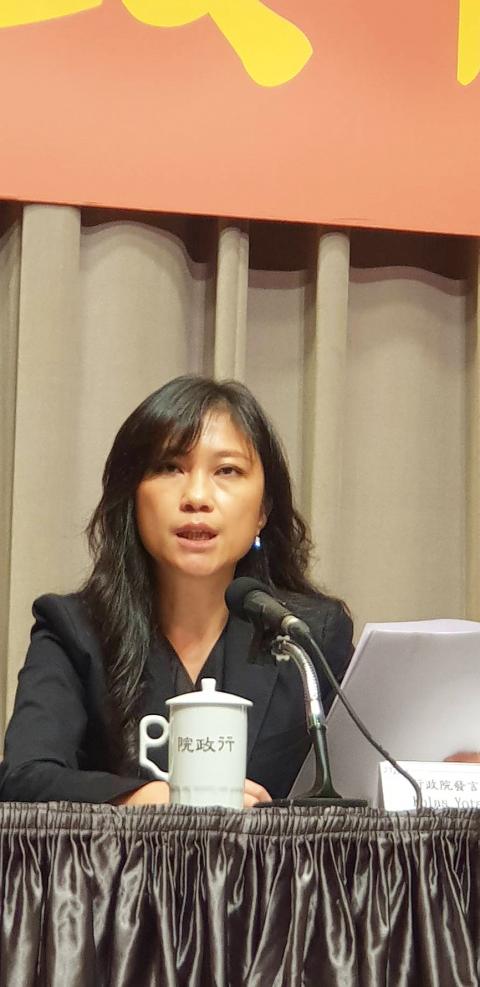The Executive Yuan is identifying loopholes in regulations against fake news in the Civil Servants Election and Recall Act (公職人員選舉罷免法) and other legislation, and plans to propose rules to curb the spread of disinformation after the nine-in-one elections on Saturday next week, sources said yesterday.
Under Article 104 of the act, those who cause others or the public at large to suffer losses by disseminating false information through text, images, video, audio or speeches are punishable by up to five years in prison.
The Executive Yuan is deliberating an amendment to tighten the rule by adding language that outlaws “systematic and mass spreading of disinformation aimed at causing a candidate to lose an election,” a person with knowledge of the matter said.

Photo: Lee Hsin-fang, Taipei Times
On orders from Premier William Lai (賴清德), Minister Without Portfolio Lo Ping-cheng (羅秉成) had held a series of intergovernmental meetings to discuss ways to combat disinformation, the source said.
The proposal could take the form of an amendment to existing laws or a separate law, they said, adding that current rules have left the government powerless to combat fake news.
Executive Yuan spokeswoman Kolas Yotaka said that the Executive Yuan is also considering amending the Social Order Maintenance Act (社會秩序維護法), the Communicable Disease Control Act (傳染病防治法), the Insurance Act (保險法) and the Agricultural Finance Act (農業金融法), as well as rewriting a draft digital communications and broadcasting bill.
An amendment to the Communicable Disease Control Act would address those who spread false information about pandemics, she added.
Lo during a meeting reportedly proposed granting targets of fake news the right to ask the source — including individuals and Web sites — to remove any links to the news and pay compensation under the Civil Code.
Kolas said that the bill includes clauses allowing people named in fake news to report people who spread it or file for provisional injunctions against them in court.
However, no additional legal channels against people who spread disinformation have been decided, she added.
Meanwhile, the Ministry of Justice warned people against sharing unsubstantiated or apocryphal news, as it could invite lawsuits.
For example, news was disseminated that during a televised debate on Saturday last week, Democratic Progressive Party Kaohsiung mayoral candidate Chen Chi-mai (陳其邁) had worn an earpiece through which aides fed him information, but it was later proved false by the Central Election Commission, it said.
While most cases involving the spread of disinformation is charged under the Social Order Maintenance Act, people who spread fake news about a candidate risk contravening the Civil Servants Election and Recall Act or defamation lawsuits, the ministry said.

Tropical Storm Gaemi strengthened into a typhoon at 2pm yesterday, and could make landfall in Yilan County tomorrow, the Central Weather Administration (CWA) said yesterday. The agency was scheduled to issue a sea warning at 11:30pm yesterday, and could issue a land warning later today. Gaemi was moving north-northwest at 4kph, carrying maximum sustained winds near its center of up to 118.8kph and gusts of 154.8kph. The circumference is forecast to reach eastern Taiwan tomorrow morning, with the center making landfall in Yilan County later that night before departing from the north coast, CWA weather forecaster Kuan Shin-ping (官欣平) said yesterday. Uncertainty remains and

SEA WARNING LIKELY: The storm, named Gaemi, could become a moderate typhoon on Wednesday or Thursday, with the Taipei City Government preparing for flooding A tropical depression east of the Philippines developed into a tropical storm named Gaemi at 2pm yesterday, and was moving toward eastern Taiwan, the Central Weather Administration (CWA) said. Gaemi could begin to affect Taiwan proper on Tuesday, lasting until Friday, and could develop into a moderate typhoon on Wednesday or Thursday, it said. A sea warning for Gaemi could be issued as early as Tuesday morning, it added. Gaemi, the third tropical storm in the Pacific Ocean this typhoon season, is projected to begin moving northwest today, and be closest to Taiwan on Wednesday or Thursday, the agency said. Today, there would likely

DISRUPTIONS: The high-speed rail is to operate as normal, while several airlines either canceled flights or announced early departures or late arrivals Schools and offices in 15 cities and counties are to be closed today due to Typhoon Gaemi, local governments announced last night. The 15 are: Taipei, New Taipei City, Taoyuan, Tainan, Keelung, Hsinchu and Kaohsiung, as well as Yilan, Hualien, Hsinchu, Miaoli, Chiayi, Pingtung, Penghu and Lienchiang counties. People should brace for torrential rainfall brought by the storm, with its center forecast to make landfall on the east coast between tonight and tomorrow morning, the Central Weather Administration (CWA) said. The agency issued a sea warning for the typhoon at 11:30pm on Monday, followed by a land warning at 11:30am yesterday. As of

CASUALTY: A 70-year-old woman was killed by a falling tree in Kaohsiung as the premier warned all government agencies to remain on high alert for the next 24 hours Schools and offices nationwide are to be closed for a second day today as Typhoon Gaemi crosses over the nation, bringing torrential rain and whipping winds. Gaemi was forecast to make landfall late last night. From Tuesday night, its outer band brought substantial rainfall and strong winds to the nation. As of 6:15pm last night, the typhoon’s center was 20km southeast of Hualien County, Central Weather Administration (CWA) data showed. It was moving at 19kph and had a radius of 250km. As of 3pm yesterday, one woman had died, while 58 people were injured, the Central Emergency Operation Center said. The 70-year-old